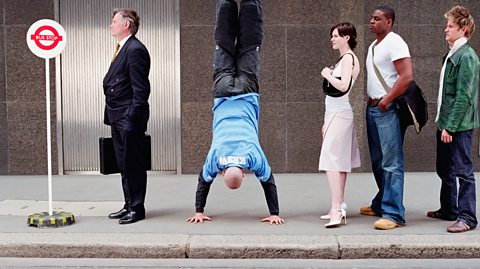The Bitesize Careers Podcast: How do I know what I'm good at?
Knowing what you're good at is one of the keys to finding a career that's right for you, but identifying your strengths and weaknesses isn't always that easy.
Join Radio 1's Katie Thistleton for the second series of The Bitesize Careers Podcast, tackling the most popular questions you've asked about the world of work. In this episode, Katie chats to award-winning careers coach Mark Anderson and student Yasmeen to answer today's big question:
How do I know what I'm good at?
Katie
Hello and welcome to the BBC Bitesize Careers Podcast. This is the podcast where we try and help you figure out what you want to do in the future. In each episode, we try and answer one of the hundreds of questions you've told us you want the answer to when it comes to your future careers. I'm Katie Thistleton, I'll be your host today, and the question we're going to try, and answer is, how do I know what I'm good at? To help me answer this question, I'm joined by two wonderful people. We've got Mark, our fantastic careers expert, who's going to be giving us all of his tips and tricks. He's helped loads of young people just like you find their path. Hello, Mark.
Mark
Hi Katie.
Katie
And I'm also joined by the wonderful Yasmeen, who is still at school. And so, like you, trying to figure out what she wants to do with her future career. Hi Yasmeen, how are you doing?
Yasmeen
Hi Katie, I'm so excited to be here.
Katie
Let's do a little bit of a warm-up game first just to get us all limbered up. Does that sound good?
Mark
Okay.
Katie
I'm going to give you different scenarios, and I want you to tell me if you think that's a strength for you or a struggle for you. And I want you to be honest, okay?
Mark
Okay.
Katie
Let's do it. First scenario, you've got to present a project in front of the whole class. Is that a strength or a struggle for you, Yasmeen?
Yasmeen
I think that would be 50/50. I enjoyed the research and coming up with a presentation, but standing in front of a big group of people is always nerve wracking, so I think that will be a bit of a struggle.
Katie
What about you, Mark?
Mark
Yeah, I would say it's probably a strength for me. It's not something when I was your age that I could have done, but I think in time, as I've done more and more of it, I've become more confident in doing it. So yeah, I think it's a strength for me.
Katie
Okay. Next one, you've been asked to organise a group project and you're the leader. Strength or struggle?
Yasmeen
I think this is a strength for me. I enjoy organising and I like seeing projects that I work on come to life. So yeah, strength.
Katie
Mark?
Mark
Struggle for me, I'm afraid. Yeah, I think it's one of those things I struggle to organise myself. So, to organise other people, not really a strength of mine.
Katie
And the last one is you're working on a maths problem and it's really challenging, a strength or a struggle.
Yasmeen
This is definitely a struggle for me. I hate getting stuck on something for a long time and not getting anywhere with it. So, maths is not my forte.
Katie
I agree with you. I don't have any patience, Mark?
Mark
Um, I think it would be a strength of mine, my maths was okay back in the day, but, um, I'm out of practice now, so don't quiz me now on it. So, don't give me any problems.
Katie
Don't worry. The next card is not full of really hard maths equations. I would never do that to you. Okay, so we've got a little idea there about some of our strengths. And that is what this episode is all about, how to know what you're good at. We know what we're good at with those three scenarios, but what else are we good at?
Katie
Yasmeen, you are interested in medicine and law, is that right?
Yasmeen
Yeah.
Katie
Okay, so that two amazing career options there, both very different. Both seem really hard. How are you navigating that decision of which one to do?
Yasmeen
I think with two very different careers, it's really important to kind of see what skills each one needs. So, medicine is a lot more science based. So, Biology, Chemistry, um, but law is a lot more written based, kind of English and a lot of, uh, negotiating and argument skills. So, I think looking at the different skills that each of them need has helped me.
Katie
Presumably at this stage, you've got skills that suit both. That's why you've still not made this decision.
Yasmeen
Yeah, I think so. Um, I think just because they're so different, it's so difficult to kind of see where the skills fit in.
Katie
Mark, what advice would you give to someone like Yasmeen? I'm sure there's lots of people watching and listening who are in the same situation. They've maybe got a couple of different careers they'd like to do, but they don't know which one is best for their skill set.
Mark
I think the more you research both options, if there are two options, the clearer you'll be about which one is the right one for you. So, um, research can be doing things like work experience. So, in your case you can try and do some work experience in law, in a law firm and then try and do some medical related work experience, talk to people who do the jobs, have those conversations. And the more you do that, the clearer you should be about which is the right choice for you. But it's not easy.
Katie
Is that something that you're doing, or you will do Yasmeen, do loads of research?
Yasmeen
Yeah, I've started doing some work experience in medicine, it's really hard to find, but I think doing it has kind of helped see the difference between what you see on TV and what you see in like kind of books, and what is the reality in the workplace away from just the education side. So that's been really interesting.
Katie
Also, the Bitesize website has got some really great tools and quizzes for this, something I wish I'd had when I was making these decisions. You can actually do a quiz on the Bitesize website, where you go through all of your skills, and it tells you the kind of careers that you might be good at. So, let's go back to that big question we're trying to answer today, Mark, how do I know what I'm good at?
Mark
A starting point can be talk to people who know you well, because sometimes we don't know what we're good at because we think it's just something that comes natural to us and it comes natural to everyone. But that's not always the case. So, if you can speak to your loved ones, people who know you well and find out from them what they think your skills and strengths are, that's a really good starting point. And then it's just about building on those strengths, so you're even better at them and you keep practising them because that's what's going to really put you in a good position for your future.
Katie
Has anyone ever told you you've got a particular strength Yasmeen that has surprised you?
Yasmeen
Yes, I think I was told that I'm good at kind of bringing ideas together, coming up with a nice conclusion, which is something I never really thought about. So that was kind of a nice surprise.
Katie
And you think that'll be good for the careers that you want to do?
Yasmeen
Yeah, I think especially for law kind of having that, um, argumentative ideas and kind of bringing everything together would help.
Katie
Has anyone ever told you you're good at arguing?
Yasmeen
Yes. I don't know if that was a compliment or not.
Katie
Well, it is if you want to be a lawyer, maybe. Right. I'm going to hand this over to you now, Yasmeen, because we're going to have a look at that Career Question Wall. What are people asking on there?
Yasmeen
We have a question here. How do I know what skills I have?
Mark
I think reflecting on things that you do naturally. So, things that you do might maybe in school, things that you do outside of school, things that you enjoy doing, you know. It's not… it's all very well saying you have a particular strength or a skill, but do you actually enjoy using that skill? And that's really important to identify.
Katie
Is there anything that you think that you do now that you think, oh yeah, that would stand me in really good stead for a law career or medicine career?
Yasmeen
I think I'm really into reading and kind of just watching vlogs or watching, um, podcasts. So, I think that kind of research element is going to be useful for either one.
Katie
You like to learn.
Yasmeen
Yes, yeah. Um, but I had a question for you, Mark. Um, how can I identify the difference between like, a skill I have for a hobby and a skill I have to take into the workplace?
Katie
Great question.
Mark
Well, in many cases, I think they can often be the same. Um, you know, there's going to be certain things that you only use as a hobby. But when you think about it deeply, some of the skills that you enjoy using, you're using naturally as a hobby and you're using it in something that's, you know, is a bit more serious. So, I think if you put them all together and then you think about which ones you would really want to be using in the job, that can really help you to identify the right path for you.
Katie
We're talking a lot about these strengths, Mark, but how can we consider our weaknesses as well when we're trying to make these decisions about our future careers?
Mark
Yeah, I think it's really important to be aware of weaknesses, because we may still need to be using those particular weaknesses in our day-to-day jobs. So, first of all, it's being aware of them. And again, you might know yourself what's a weakness or somebody else might tell you. But then it's also important to address those and try and get a little bit better at them. But I would say don't necessarily spend too much time focusing on those weaknesses. I think the most important thing is to make your strengths even better.
Katie
But we all have them and that's okay, isn't it? Like we said before, you know, you two would be very different people in a group scenario. But I think that would make you great at being in a group together and doing a group project. You need people to have different strengths and weaknesses. Yasmeen do you have another question from the Career Question Wall?
Yasmeen
We have, what are the key skills to develop for success in today's job market?
Mark
Oh, that's a good one because, you know, things are changing. The world of work is changing. So, the skills that are required now or in the future might be different to what was required in the past. But I would say that the key skills are communication skills, um, problem-solving skills. And I think they've always been the case. But also, now adaptability and resilience are really important as well.
Katie
Okay. Why don't we as our takeaway task today, because we like to give you something to do to go away and do and think about why don't we play that strengths and struggles game again. But we'll do it with those skills that you just mentioned. What's the first one again?
Mark
Right so the first one was communication skills. And that's really important. It's not just about talking. It's about listening as well and being able to reflect back what you've heard. So how do you feel you are with communication skills?
Yasmeen
I think I can communicate quite well, but I think, um, listening to what other people say and kind of seeing it from a different perspective can sometimes be a bit difficult. So maybe that's a weakness.
Mark
Uh, what else have we got? We said, uh, problem solving. You know, in a school scenario, you could be talking about solving problems in maths, for example. But in everyday life we are presented with opportunities to solve problems. You know, it could be personal problems or something like that. So, problem solving is really important.
Yasmeen
I think that's a strength for me. I think I quite enjoy sticking at a task and kind of seeing how to solve it. If we avoid maths, then yeah, problem solving is a strength for me.
Mark
And then we've also got adaptability. That's really important because when you have, let's say, a job description, sometimes you might need to go off-piste and do something slightly different, or you're being asked to do something slightly different. And we do need to be adaptable because the world of work is changing a lot, and we don't know what the future holds. So, it's a real skill to be adaptable.
Yasmeen
Yeah, I think that's also something I need to work on because, uh, when things change, when I have plans and they get cancelled, that really stresses me out.
Katie
Don't like change. A lot of people don't like change.
Mark
Yeah, yeah. You know, one of the big things about, uh, changing the world of work is AI, you know, and that's having such a massive impact on the way the world of work is. So, when you go into a particular job, that job might change in the future. So, it's really important that we do have that adaptability.
Katie
Right, what's the last skill?
Mark
The last skill is resilience because there are going to be lots of ups and downs in your career. And it's really important that we develop resilience so that we when we do get those setbacks, we can get up, dust ourselves down and keep going again. And that's a really important quality to have in today's job market.
Yasmeen
I think that might be a strength for me. I think once I enjoy something and once I've got my mind on it, I like to keep at it. And so, yeah, I think it's a strength.
Mark
Good.
Katie
Have a little think about your answers to that game. Maybe you'll look at the strengths and think, oh, I could do a job with those skills because I'm really good at that stuff. Maybe I'll look at the struggles and think, oh, I need to improve in those areas. Or maybe you want to go for a job that doesn't require those skills because you're never going to be good at those things. That's absolutely fine. Remember the BBC Bitesize Careers website is great for that. There's a quiz on there you can do all about the skills that are your strengths and the careers that might be good for you. If you're good at those particular things. You can also watch more episodes on the Bitesize Careers website, or you can listen to them on BBC Sounds. Until then, keep exploring, keep learning. And remember, you don't have to have everything figured out just yet. Take your time and discover those strengths. You will have some there even if you feel like you haven't, and the rest will follow. Thank you so much, Mark.
Mark
Thank you,
Katie
Thank you, Yasmeen.
Yasmeen
Thank you.
Mark
Take care.
Podcast key moments
- Introduction from Katie: 00:00
- Strength or struggle warm-up game: 00:53
- Your questions answered:
- How do I know what I’m good at? - Yasmeen’s point of view: 02:30
- How do I know what I’m good at? - Mark’s advice: 04:30
- How do I know what skills I have?: 04:35
- How can I identify the differences between the skills I have for a hobby and a workplace?: 06:15
- How can we identify our weaknesses?: 06:51
- What are the key skills to develop for success in today’s job market?: 07:38
- Takeaway task: 08:06
- Final words from Katie: 10:15
Top tips for finding your strengths and weaknesses
- Ask people who know you well what they think your strengths and weaknesses are. You might be surprised at the answers!
- Reflect on things you're good at and enjoy to understand the skills you already have
- Be honest with yourself about where you struggle and where you thrive
- Research the kinds of jobs that interest you. This can tell you the skillset you need to work on
- Focus on your strengths and getting even better at them, but be aware of your weaknesses. They can tell you where you need to improve but can also guide you towards careers that celebrate your own skillset.
Takeaway task
This task will help you to explore where your strengths really are.
Take a look at the following key skills and think if they're strengths or weaknesses for you. Are they a strength in some situations and a weakness in others? What could you do to improve where you're struggling or to develop your strengths further?
- Communication
- Problem-solving
- Adaptability
- Resilience.
The Bitesize Careers Podcast on BBC Sounds
The Bitesize Careers Podcast. podcastThe Bitesize Careers Podcast
Listen to The Bitesize Careers Podcast on BBC Sounds.

Discover more on Bitesize Careers
The Bitesize Careers Podcast: How do I turn my passion into a job? videoThe Bitesize Careers Podcast: How do I turn my passion into a job?
Join Radio 1's Katie Thistleton and our guests to help you identify your hobbies and to transform them into a career.
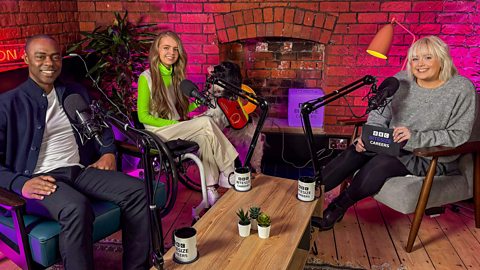
The Bitesize Careers Podcast: How to find a job you'll enjoy. videoThe Bitesize Careers Podcast: How to find a job you'll enjoy
Join Radio 1’s Katie Thistleton, careers coach Arit Eminue MBE, and microgravity research scientist Katie King for some top tips.
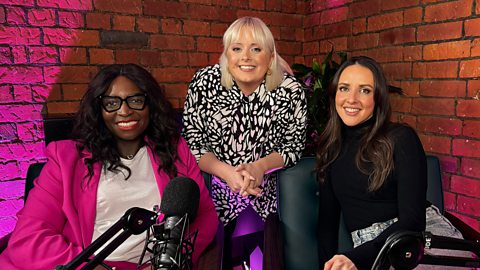
The Bitesize Careers Podcast: Where can my subjects take me? videoThe Bitesize Careers Podcast: Where can my subjects take me?
Katie Thistleton and special guests chat about your career options.
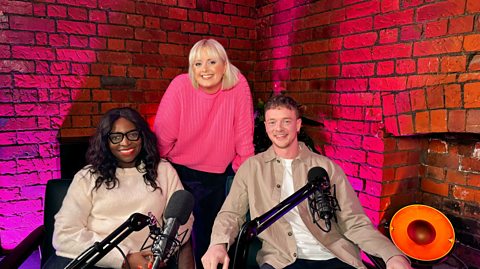
Quiz: What is your perfect job? quizQuiz: What is your perfect job?
Try this fun quiz to find out about the types of jobs you might enjoy and different careers you could consider.
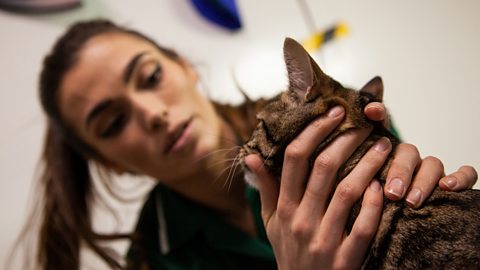
Help! I don’t have any skills… videoHelp! I don’t have any skills…
The transferable skills you never even knew you had.
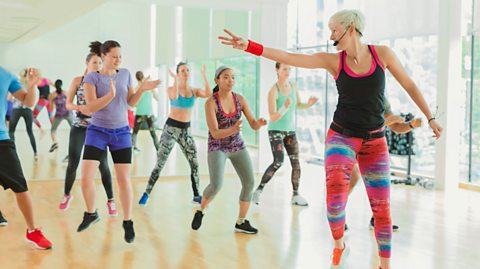
Ten skills you might not know you had
You have more skills than you realise and they are valuable to employers. Here a list of 10 personal skills you might not have thought about.
